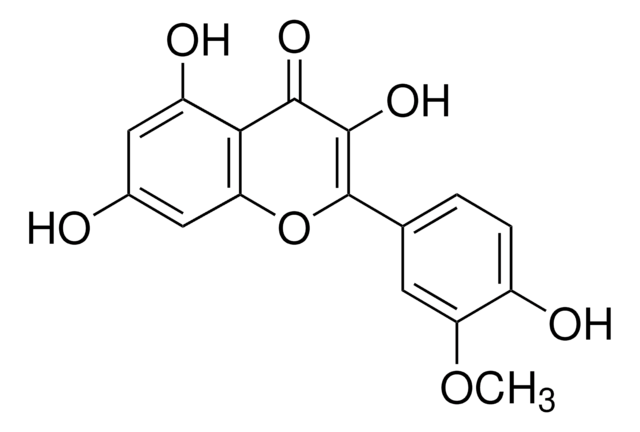G5547
GSK837149A
≥98% (HPLC), solid
Synonym(s):
N,N′-Di[4-(4-Methyl-pyrimidin-2-ylsulfamoyl)phenyl]-urea
Sign Into View Organizational & Contract Pricing
All Photos(1)
About This Item
Empirical Formula (Hill Notation):
C23H22N8O5S2
CAS Number:
Molecular Weight:
554.60
UNSPSC Code:
51111800
NACRES:
NA.77
Recommended Products
Quality Level
Assay
≥98% (HPLC)
form
solid
color
white to off-white
solubility
DMSO: >10 mg/mL
H2O: insoluble
originator
GlaxoSmithKline
storage temp.
2-8°C
Biochem/physiol Actions
GSK837149A is the first selective inhibitor of human fatty acid synthase (FAS) known to act specifically and selectively on the KR activity of the enzyme. It was first isolated as a minor impurity in a sample found to be active against the enzyme in a high-throughput screening campaign. This compound and its analogs synthesized, all being symmetrical structures containing a bisulfonamide urea, act by inhibiting the beta-ketoacyl reductase activity of the enzyme. GSK837149A inhibits FAS in a reversible mode, with a Ki value of approximately 30 nm, and it possibly binds to the enzyme-ketoacyl-ACP complex. Although initial results suggest that cell penetration for these compounds is impaired, they still can be regarded as useful tools with which to probe and explore the beta-ketoacyl reductase active site in FAS, helping in the design of new inhibitors.
Features and Benefits
This compound was developed by GlaxoSmithKline. To browse the list of other pharma-developed compounds and Approved Drugs/Drug Candidates, click here.
Signal Word
Warning
Hazard Statements
Precautionary Statements
Hazard Classifications
Eye Irrit. 2
Storage Class Code
11 - Combustible Solids
WGK
WGK 2
Flash Point(F)
Not applicable
Flash Point(C)
Not applicable
Personal Protective Equipment
dust mask type N95 (US), Eyeshields, Gloves
Certificates of Analysis (COA)
Search for Certificates of Analysis (COA) by entering the products Lot/Batch Number. Lot and Batch Numbers can be found on a product’s label following the words ‘Lot’ or ‘Batch’.
Already Own This Product?
Find documentation for the products that you have recently purchased in the Document Library.
Customers Also Viewed
David Weigt et al.
Cell chemical biology, 26(9), 1322-1331 (2019-07-08)
Human cancers require fatty acid synthase (FASN)-dependent de novo long-chain fatty acid synthesis for proliferation. FASN is therefore an attractive drug target, but fast technologies for reliable label-free cellular compound profiling are lacking. Recently, MALDI-mass spectrometry (MALDI-MS) has emerged as
Prosanta K Singha et al.
European journal of pharmaceutical sciences : official journal of the European Federation for Pharmaceutical Sciences, 149, 105321-105321 (2020-04-11)
De novo synthesis of fatty acids is essential to maintain intensive proliferation of cancer cells. Unlike normal cells that utilize food-derived circulating lipids for their fuel, cancer cells rely on heightened lipogenesis irrespective of exogenous lipid availability. Overexpression and activity
Our team of scientists has experience in all areas of research including Life Science, Material Science, Chemical Synthesis, Chromatography, Analytical and many others.
Contact Technical Service










